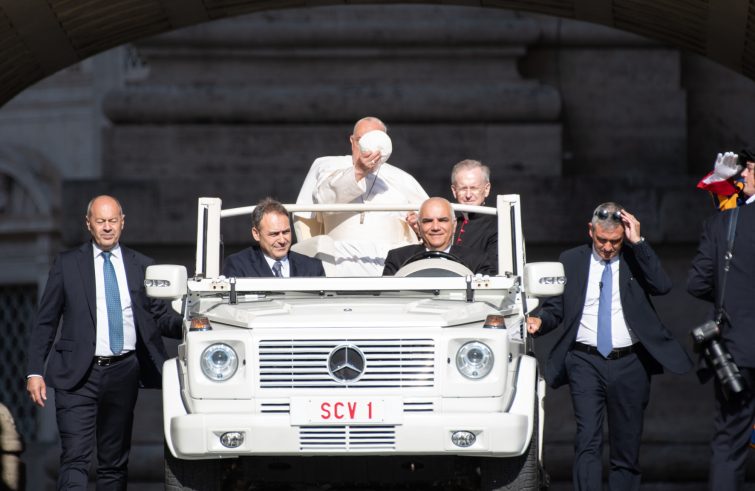
“We are still too Eurocentric, or as they say, ‘western’. But in reality, the Church is much bigger, much bigger than Rome and Europe! And also, if I may say so, much more alive, in those countries!”, Pope Francis exclaimed in his catechesis for the weekly general audience that retraced the legs of his 45th Apostolic Journey to Asia and Oceania, which he described as “a memorable journey.” “I experienced this in an emotional way in the meetings with those communities, hearing testimonies of priests, nuns, laypeople, and catechists”, he remarked referring to the longest apostolic journey of his pontificate. “Catechists are those who drive evangelization”, Francis added in unscripted remarks: “Churches that do not proselytize, but grow ‘by attraction’, as Benedict XVI wisely said.”
“I would like to present two suicidal people to you: these two are getting married next Saturday!”,
This was the Pope’s opening line before starting the catechesis, when he summoned two young people to the podium next to him – …who read, he in Spanish, she in Polish, the passages introducing the Wednesday audience. “It is beautiful to see when love leads us on to form a new family”, Francis continued off-text, asking for a round of applause for them. In the greetings to the Polish faithful the Pope reiterated his thoughts on family and children: “children are the wealth of every nation, including here in Europe.” Before concluding the general audience, the Holy Father sent out a renewed appeal for peace.
“I thank the Lord who allowed me to do as an elderly Pope what I would have liked to do as a young Jesuit, because I wanted to go there as a missionary”, he said in words flowing with gratitude.
In Indonesia “I saw that fraternity is the future, it is the answer to anti-civilization, to the diabolical plots of hatred and war – also sectarianism”, the Pope said summarising the highlights of the first leg of his journey, where he encountered “a lively, dynamic Church, capable of living and transmitting the Gospel in a country which has a very noble culture, inclined to harmonize diversity, and at the same time has the largest Muslim presence in the world.” “In that context, I received confirmation that compassion is the path that Christians can and must walk to bear witness to Christ the Saviour, and at the same time to encounter the great religious and cultural traditions”, Francis remarked: “Let us not forget the three characteristics of the Lord: closeness, mercy and compassion”, he added off-text: “If a Christian does not have compassion, he is of no use.” “Faith, fraternity, compassion” was the motto of the visit to Indonesia. “These words are like a bridge, like the underpass that connects the Cathedral of Jakarta to the largest Mosque in Asia.”
In the young “I saw a new future, without tribal violence, without dependency, without ideological and economic colonialism; a future of fraternity and care for the wondrous natural environment”,
the snapshot of Papua New Guinea, where the Pope rediscovered “the beauty of a missionary outbound Church”, whose protagonists “have been and still are the missionaries and catechists.” In unscripted remarks Francis mentioned his visit to Vanimo, “where the missionaries are between the forest and the sea. They enter the forest in search of the most hidden tribes.” “Faith must be inculturated and cultures must be evangelized”, the Pope pointed out, highlighting “the power of the Christian message of human and social promotion” that is particularly evident in the history of Timor-Leste, where “the Church has shared the independence process with the entire population, always guiding it towards peace and reconciliation”, Francis said, revealing that he was “struck by the beauty of the people: Aapopulation that not only bears a lot of children but also teaches them how to smile.”
I will never forget the smile of the children of that land:
the children there smile all the time, and there are many of them. That faith teaches them to smile, and this is a guarantee for the future. In short, in Timor-Leste I saw the youthfulness of the Church: families, children, young people, many seminarians and aspirants to consecrated life. I would like to say, without exaggeration, that I breathed the ‘air of springtime’ there!” “A country very different to the other three: a city-State, ultra-modern, an economic and financial hub for Asia and beyond”, is the snapshot of Singapore, where “Christians are a minority, but they nonetheless form a lively Church, engaged in fostering harmony and fraternity between the various ethnicities, cultures and religions”: “Even in wealthy Singapore there are the “little ones”, who follow the Gospel and become salt and light, witnesses to a hope greater than what economic gains can guarantee.”
“I would like to thank these peoples who listened to me with such warmth, with such love,
and to thank their governors who helped a great deal with this visit, so that it could be conducted without problems”, the final tribute: “I thank all those who also collaborated in this, and I give thanks to God for the gift of this journey! And I reiterate my gratitude to everyone, to all of them. May God bless the peoples I encountered, and guide them on the way to peace and fraternity!”












